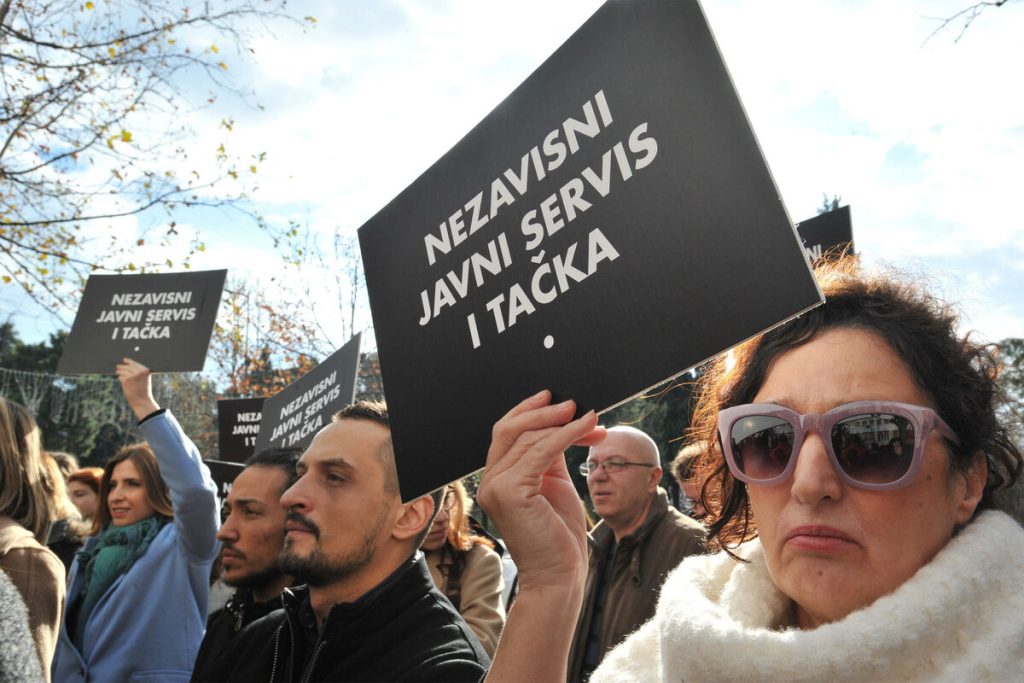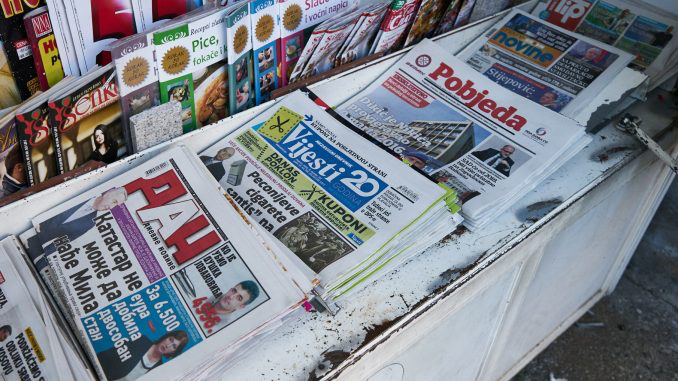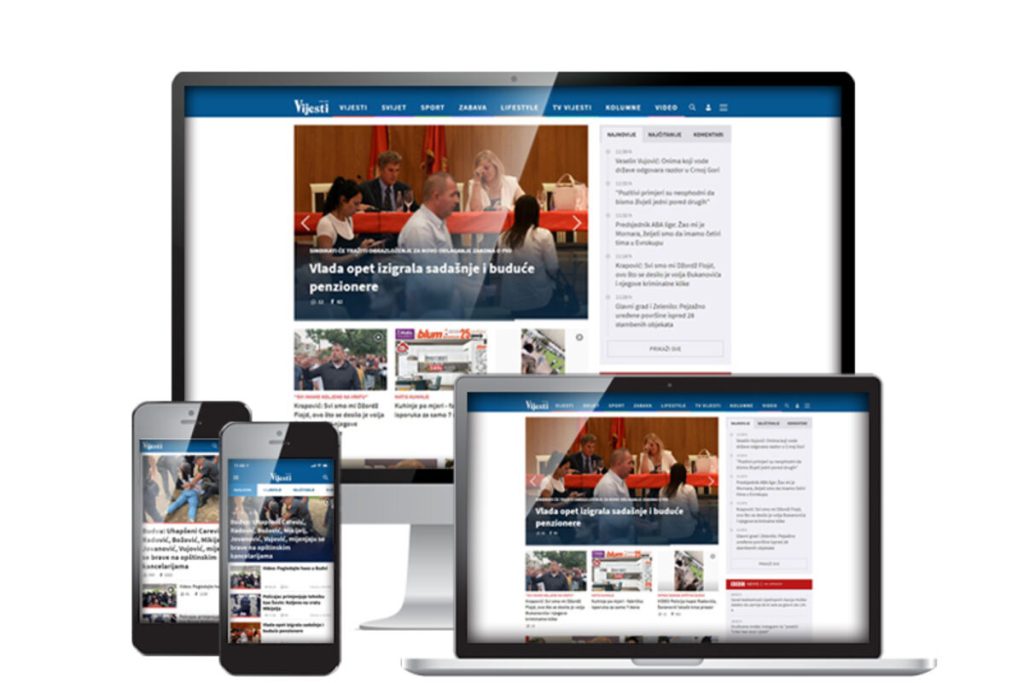Montenegro places a strong emphasis on protecting freedom of expression as a fundamental democratic right. The Constitution of Montenegro guarantees the right to freedom of thought, opinion, expression, and the freedom to seek, receive, and impart information and ideas. This includes the right to criticize the government, engage in public debates, and express diverse opinions.

The country has implemented legal frameworks that support freedom of expression. The Law on Media, for instance, establishes regulations to ensure media pluralism, promote editorial independence, and protect journalists’ rights. It also prohibits censorship and guarantees access to information.
The Law on Public Broadcasting Services ensures the autonomy of the national public broadcaster, while the Law on Electronic Media regulates private media outlets and sets standards for their operation.
Montenegro has established regulatory bodies such as the Agency for Electronic Media (AEM) and the Council for Electronic Media (CEM) to oversee and regulate the media sector. These bodies work to ensure compliance with media laws, protect media freedoms, and address any violations or complaints.
Montenegro has a relatively diverse media landscape, with numerous newspapers, television stations, and online platforms representing different political affiliations and viewpoints. As of 2021, in Montenegro are over 80 registered television stations, around 70 radio stations, and numerous print and online publications. Journalists are generally able to carry out their work independently, investigating and reporting on a wide range of topics. This helps to foster public discourse and ensure the availability of diverse information to citizens.

However, challenges to freedom of expression exist. According to the Reporters Without Borders (RSF) World Press Freedom Index 2021, Montenegro ranks 105th out of 180 countries. While media freedom is generally respected, concerns have been raised regarding self-censorship, concentration of media ownership, and occasional acts of intimidation against journalists. There have been concerns raised about media ownership concentration and potential political influence over media outlets, which could affect the plurality of voices in the media landscape. There have also been instances of harassment, threats, and attacks against journalists, particularly when they are involved in sensitive investigations or reporting on issues such as corruption or organized crime. The Media Pluralism Monitor, which assesses media pluralism and freedom in European countries, gave Montenegro a score of 46% in 2020. This indicates a moderate level of media pluralism, with areas for improvement identified in media ownership transparency, media financing, and regulatory safeguards.
To address these challenges, Montenegro continues to work on strengthening the implementation and enforcement of existing laws that protect freedom of expression. Efforts are made to ensure the safety of journalists, promote media independence, and address issues related to media ownership and political influence. Furthermore, organizations and institutions, both domestic and international, play a role in monitoring and advocating for freedom of expression in Montenegro.

Newspapers play a significant role in Montenegro’s media scene. There are several daily and weekly newspapers that cover a wide range of topics, including politics, current affairs, business, culture, and sports. Some popular newspapers in Montenegro include “Dnevne Novine,” “Vijesti,” “Pobjeda,” and “Dan.” These newspapers offer different editorial stances and provide platforms for journalists and columnists to express their opinions.
Television is also a prominent medium in Montenegro. There are several national and regional television stations that offer news programs, talk shows, documentaries, and entertainment content. The national public broadcaster, RTCG (Radio Television of Montenegro), provides news coverage and programming in multiple languages, including Montenegrin, Serbian, Albanian, and Bosnian. Radio and Television of Montenegro (RTCG) operates multiple radio and TV channels, providing a diverse range of programming and news content. Public broadcasting aims to serve the public interest and provide independent and objective news coverage. Private television stations, such as TV Vijesti and TV Prva, also contribute to the media landscape with their news and entertainment content.
Radio stations are an integral part of Montenegro’s media outlets. They provide a platform for news broadcasts, talk shows, music, and cultural programs. Both public and private radio stations operate throughout the country, offering diverse content and catering to various interests and communities.

Individuals in Montenegro actively engage in public discourse through media outlets. They can express their opinions, share experiences, and participate in discussions on various platforms. Letters to the editor, opinion pieces, and comment sections provide spaces for individuals to voice their thoughts and concerns. Call-in radio shows and televised debates allow citizens to engage in live discussions on pressing issues. Online forums and social media platforms further expand opportunities for individuals to express themselves and connect with others. The Law on Free Access to Information ensures that individuals have the right to access public information held by state bodies and institutions. This law contributes to transparency, accountability, and the public’s right to be informed about government activities and decisions.
Digital media has significantly influenced freedom of expression in Montenegro. Online news portals, blogs, and social media platforms offer individuals alternative avenues to express their views and disseminate information. They have become essential tools for citizen journalism, enabling individuals to report on events, share eyewitness accounts, and contribute to public debates.
Online media has gained significant popularity in Montenegro – as of 2021, Montenegro has a relatively high internet penetration rate. Approximately 82% of the population has access to the internet, enabling widespread online news consumption and digital media engagement. Numerous news portals, blogs, and online platforms provide news coverage, analysis, opinion pieces, and multimedia content. These digital outlets allow for real-time updates, interactive features, and the ability to engage directly with readers through comments and social media platforms.
In recent years, social media platforms have become an important avenue for news dissemination and public discussion. Montenegrin citizens actively engage in social media platforms such as Facebook, Twitter, Instagram, and YouTube to share news, express their opinions, and participate in discussions on various topics. Social media platforms also facilitate the mobilization of support for causes, allowing citizens to organize and advocate for social and political change.

Trust in media outlets plays a crucial role in the functioning of a democratic society. According to a survey conducted by Ipsos in 2020, public trust in the media in Montenegro is relatively low. Only around 30% of respondents expressed trust in the media, indicating a need for increased transparency, accuracy, and accountability in journalistic practices. Local media outlets tend to enjoy higher levels of trust compared to national or international media. This is because local media is often perceived as more connected to the community and focused on local issues and interests. Montenegro’s media landscape has been criticized for its close ties to political parties and influential individuals. This can create skepticism among the public about the independence and objectivity of media outlets. There have been instances where media organizations have been accused of favoring certain political interests, leading to a perceived lack of credibility. Studies have shown that younger generations tend to have lower levels of trust in traditional media compared to older generations. This can be attributed to the rise of digital media and the influence of social media platforms as alternative sources of news and information. Social media platforms, while serving as a source of news for many individuals, often face lower levels of trust. Concerns about the spread of misinformation and the lack of editorial standards on social media platforms have contributed to a lower trust in the information shared through these channels.
Transparency in media ownership and funding is an important factor in building trust. However, in Montenegro, there have been concerns about the lack of transparency regarding media ownership, financial interests, and potential conflicts of interest. This opacity can raise doubts among the public about the motives and agendas behind certain media organizations.
The best service for detailed proprietary data searches is Domaintools. Basic search on this page is free, while detailed search requires a subscription. There are many similar free services that will give basic information about the domain we are interested in (whois.com, who.is, etc.). By entering the address in these search engines, we will receive information about the data of the person or legal entity that leased the domain, server IP addresses and other useful information.
References:
- Private library and researches – presentations from follow-up workshops
- Wikipedia